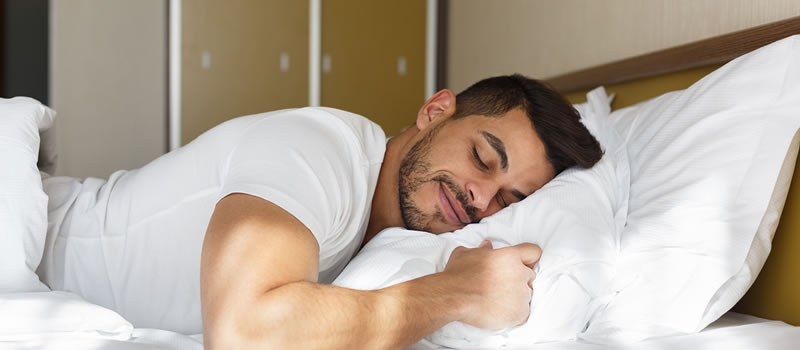How much sleep do we really need?
Published April 13, 2021

We all know the magical, restorative power of a good night’s sleep. Waking up feeling refreshed and ready to conquer the day is a sure sign that you have had some quality ‘zzz’ during the night. If you’ve missed out on getting enough sleep, it’s getting through the day is undeniably much harder: your energy slumps, concentrating becomes more difficult and you can feel grumpy and moody.
While there are generalised recommendations for how much sleep you should get, there is no magic number. You may feel like a zombie on any less than eight hours sleep, but your partner may be able to thrive on a mere five. This is because our sleep needs are individual just like other characteristics you’re born with and can also be affected by lifestyle and health factors. It’s important to assess how you feel throughout the day on different amounts of sleep to find what ‘number’ works for you. If you’re meeting your sleep needs, you’ll feel refreshed when you wake up, and energetic and alert all day long. If you need to hit the snooze button multiple times in the morning or rely on caffeine to get you through the day, then you may be sleep deprived. This is an indication that it’s time to stop and take stop of your sleep patterns and make changes before a lack of sleep starts to affect your health.
Basal sleep and sleep debt
For healthy adults between the ages of 18–60, at least seven hours of sleep is recommended to optimise health and wellbeing. This is what’s called the ‘basal recommendation’, meaning that we need to get this amount of sleep on a regular basis.
To establish just how much each individual requires will depend on the sleep debt factor. Sleep debt occurs when we have too little sleep due to poor sleeping habits, shift work, illness or other causes. Just like a loan shark, your body will eventually demand that the debt is paid. This unresolved sleep debt will take its toll on your body and mind, so it is essential that you make up for it by sneaking in an hour or two extra each night or on the weekends. It can take several weeks to recoup your losses.
Types of sleep
Sleep is not a passive state where your body and brain shut off, but rather a highly active state where the day’s events are processed and energy is restored. The brain is active during sleep and moves through different stages throughout the night.
There are two different stages of sleep, both of which play an essential role in preparing the body for the day ahead. The first stage of sleep, non-rapid eye movement (NREM) sleep makes up 75% of our sleep time and consists of four sub-stages, the last of which is our ‘deep sleep’ state. After 1.5–2 hours of NREM deep sleep, we progress into rapid-eye movement (REM) sleep.
Non-rapid eye movement (NREM) sleep
NREM sleep occurs in cycles during every normal period of sleep and is usually dreamless. Every time you wake up throughout the night, you revert back to Stage 1 of NREM sleep, which is why you don’t feel well-rested after an evening of frequently-disturbed sleep. The sub-stages of NREM sleep are as follows:
- Stage 1 — is the transition to sleep and consists of dozing or drowsiness. This lasts approximately 1–7 minutes.
- Stage 2 — is a ‘light sleep’ state where we lose awareness of our surroundings, our temperature drops and breathing and heart rate slow down and lasts about 10–25 minutes.
- Stage 3 and 4 — is our deep sleep state where blood pressure, heart rate and breathing become very slow and our muscles relax. This stage is referred to by sleep scientists as ‘slow-wave sleep’. This is the stage in which growth and repair processes occur. It’s difficult to be woken from this stage of sleep, but if you are, you’ll probably feel disoriented, groggy or confused.
Rapid eye movement (REM) sleep
REM sleep makes up the remaining 25% of our night’s sleep and takes place after an extended period in NREM ‘slow-wave sleep’. Once you enter REM sleep, you commonly cycle back and forth between NREM and REM sleep. In the REM stage, our eyes move rapidly (hence the name), breathing becomes irregular and our blood pressure rises. This is the stage where most dreaming happens. In newborns, REM sleep occupies half of the total sleep time which indicates the important role REM sleep plays in promoting growth and development in the nervous system.
Recommended sleep requirements
It’s probably no surprise to most people that babies, children and teenagers require more sleep than adults. Additional sleep is required to support these rapid periods of both physical and psychological growth. As with adults, every child is different in terms of how much sleep they need. The amount of sleep your child needs also changes as they age.
The National Sleep Foundation provides the following recommendation on sleep requirements for all stages of life:
- Newborns (0 to 3 months) — 14–17 hours of sleep per night
- Infants (4 to 11 months) — 12–15 hours of sleep per night
- Toddlers (1 to 2 years) — 11–14 hours of sleep per night
- Pre-schoolers (3 to 5 years) — 10–13 hours of sleep per night
- Primary-school age (6 to 11 years) — 9–11 hours of sleep per night
- High-school age (12 to 17 years) — 8–10 hours of sleep per night
- Adults (18 to 64 years) — 7–9 hours of sleep per night
- Older adults (65+) — 7–8 hours of sleep per night
Why do we need this much sleep?
Sleep is one of the cornerstones of good health and helps to refresh the mind and repair the body. Research shows that sleep is an important modulator of the immune response. A lack of sleep can weaken immunity, increasing your susceptibility to infection. It is also associated with weight gain.
What we eat, and how much, are also affected by the amount of sleep we get. Since hormones are regulated during sleep, when you are sleep deprived, your hunger hormones get out of whack, which increases feelings of hunger. It’s not a coincidence that you find yourself reaching for junk food when you’re exhausted.
In recent years, research has also shown that waste materials are flushed out of our brains while we sleep.
Once you’ve established how many hours of sleep you need each night, avoid regarding it as a luxury, and factor it into your daily schedule. In turn, you’ll feel happier, healthier and more productive each day.
If you’re finding it difficult to achieve your recommended 7–9 hours sleep due to restlessness or a myriad of other potential factors, Nature’s Own has a range of Sleep Support products which are designed to help you have a great night’s sleep.
MAT-AU-2003174
Learn about which Nature's Own product may be appropriate for you.
SEE THE PRODUCTS HERE







